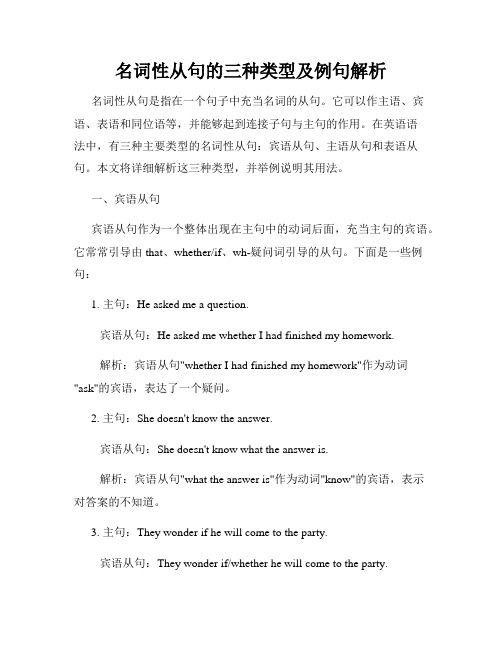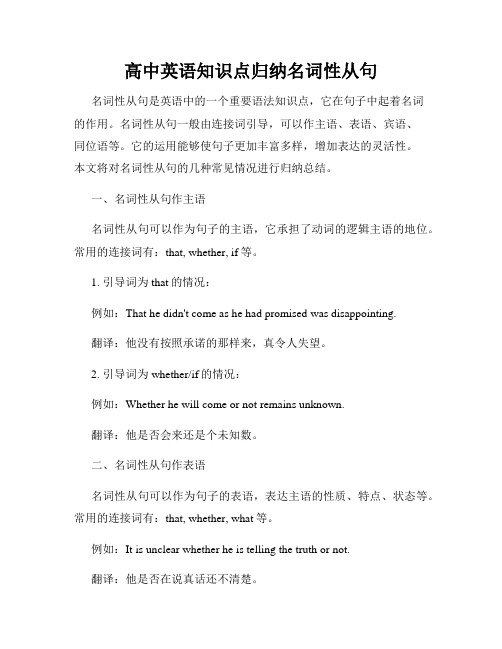高中英语语法名词性从句的用法
英语中的名词性从句

英语中的名词性从句名词性从句是英语语法中的一个重要部分,它在句子中充当名词的角色。
在英语中,名词性从句可以作为主语、宾语、表语或同位语,起到连接句子的作用。
本文将探讨名词性从句的不同类型以及其在句子中的应用。
一、名词性从句的类型名词性从句分为主语从句、宾语从句、表语从句和同位语从句。
这些从句的不同类型决定了它们在句子中的不同作用。
1. 主语从句主语从句作为句子的主语,引导整个句子的核心内容。
例如:"What she said is true."(她说的是真的。
)在这个例子中,主语从句"What she said"作为整个句子的主语,起到引导句子核心内容的作用。
2. 宾语从句宾语从句作为句子的宾语,接受动词的作用。
例如:"I don't know where she went."(我不知道她去哪儿了。
)在这个例子中,宾语从句"where she went"作为不及物动词"know"的宾语,接受动词的作用。
3. 表语从句表语从句作为句子的表语,用来描述主语或宾语的性质或状态。
例如:"The important thing is that you try your best."(重要的是你要尽力而为。
)在这个例子中,表语从句"that you try your best"用来描述主语"the important thing"的性质。
4. 同位语从句同位语从句用来解释或说明名词的含义。
例如:"His belief that hard work pays off is inspiring."(他坚信努力工作会有回报,这令人鼓舞。
)在这个例子中,同位语从句"that hard work pays off"用来解释名词"belief"的含义。
高中英语名词性从句用法

高中英语名词性从句用法从句是相对于主句而言的,即它是从属于某一个主句,而不能单独作一个句子。
在英语中,主要有三大从句,即名词性从句(包括主语从句,宾语从句,表语从句,同位语从句)、形容词性从句(即定语从句)、副词性从句(即状语从句,包括时间、条件、结果、目的、原因、让步、地点、方式等)。
在句子中起名词作用的句子叫名词从句(Noun Clauses)。
名词从句的功能相当于名词词组,它在复合句中能担任主语、宾语、表语、同位语等,因此根据它在句中不同的语法功能,名词从句又可分别称为主语从句、宾语从句、表语从句和同位语从句。
引导名词性从句的连接词可分为三类:(1)从属连接:that,whether,if(不充当从句的任何成分)(2)连接代词:what,whatever,who,whoever,whom,whose,which.(3)连接副词:when,where,how,why名词性从句知识点汇总1、名词性从句的分类名词性从句,包括四种从句,即主语从句、宾语从句、表语从句、同位语从句。
因为主语、宾语、表语、同位语这四种成分均可以由名词构成,所以这四种从句在主句中都充当了名词的作用,故将这四种从句统称为名词性从句。
如:1.That she will help me made us happy.(主语从句)2.I can understand what he said.(宾语从句)3.This is where I was born.(表语从句)4.The fact that a heavy earthquake happened made me crazy.(同位語从句)2、名词性从句的连接词分类1.that(无含义,不充当成分)2.whether,if(有“是否”的含义,但不充当成分)3.连接代词:what,whatever,who,whoever,whom,whomever,whose,which,whichever.(在从句中做主语、宾语、表语和定语)连接副词:when,whenever,where,wherever,how,however,why (在从句中做状语)4. as if,as though,because(不充当成分,在名词性从句中只引导表语从句)3、连接词that 在名词性从句中可以省略的三种情况1.it 做形式主语,that引导主语从句时It is said (that) he has been studying abroad.据说他一直在国外学习。
高考英语语法知识点:名词性从句

高考英语语法知识点:名词性从句1500字名词性从句是指在句子中充当名词的成分的从句。
名词性从句分为主语从句、宾语从句、表语从句和同位语从句。
在高考英语中,名词性从句是考查的重点之一,我们需要对名词性从句的结构和用法有透彻的理解。
下面是关于名词性从句的一些重要知识点:1.主语从句主语从句在句中充当主语的作用。
主语从句通常以that引导,也可以用whether或if 引导。
例如:- That he is guilty is certain.- Whether we will win the game is yet to be seen.- If it will rain tomorrow is still uncertain.2.宾语从句宾语从句在句中充当宾语的作用。
宾语从句通常以that引导,也可以用whether或if 引导。
需要注意的是,当主句的动词是说、tell、ask、think、believe、know等表示说话、思考、感觉的动词时,常用连词that引导宾语从句,但如果宾语从句的主语与主句的主语相同,可以省略连词that。
例如:- I know that he is a good student.- She asked me if/whether I had finished my homework.- He told her (that) he loved her.3.表语从句表语从句在句中充当表语的作用。
表语从句通常以that引导,也可以用whether或if 引导。
例如:- The fact that he didn't come is disappointing.- The question is whether we should proceed with the plan.- My concern is if/whether we have enough time.4.同位语从句同位语从句用来解释或说明前面名词的具体内容或意义。
名词性从句的种类和用法

名词性从句的种类和用法名词性从句是一个句子的组成部分,充当名词在句中的角色。
名词性从句可以充当主语、宾语、表语或同位语,起着连接主句和从句的作用。
在英语语法中,名词性从句分为三种种类:主语从句、宾语从句和表语从句。
接下来逐一介绍这些种类的用法。
一、主语从句主语从句在句中充当主语的角色。
它可以回答“谁/什么是……?”的问题。
以下是一些例子:1. Whether the weather will be good tomorrow is still uncertain. (无论明天天气如何,现在还是不确定)2. That he won the competition is beyond doubt. (他赢得比赛是毋庸置疑的)3. What you say is important. (你说的话很重要)二、宾语从句宾语从句在句中作为动词的宾语出现。
它可以回答“我做什么?我想什么?”等问题。
以下是一些例子:1. I believe that love can change the world. (我相信爱可以改变世界)2. She asked me if I could help her with the project. (她问我是否能帮助她完成这个项目)3. They didn't realize how important education is to their future. (他们没有意识到教育对于他们的未来有多么重要)三、表语从句表语从句在句中充当表语的角色,用来描述主语或宾语的特征、状态等。
以下是一些例子:1. His dream is that he can travel around the world. (他的梦想是能够环游世界)2. The fact is that he lied to us. (事实是他对我们撒谎了)3. The problem is whether we can find a solution. (问题是我们是否能找到解决办法)总结名词性从句是英语语法中的重要概念,通过适当使用名词性从句可以使句子更加丰富,表达更加准确。
名词性从句的三种类型及例句解析

名词性从句的三种类型及例句解析名词性从句是指在一个句子中充当名词的从句。
它可以作主语、宾语、表语和同位语等,并能够起到连接子句与主句的作用。
在英语语法中,有三种主要类型的名词性从句:宾语从句、主语从句和表语从句。
本文将详细解析这三种类型,并举例说明其用法。
一、宾语从句宾语从句作为一个整体出现在主句中的动词后面,充当主句的宾语。
它常常引导由that、whether/if、wh-疑问词引导的从句。
下面是一些例句:1. 主句:He asked me a question.宾语从句:He asked me whether I had finished my homework.解析:宾语从句"whether I had finished my homework"作为动词"ask"的宾语,表达了一个疑问。
2. 主句:She doesn't know the answer.宾语从句:She doesn't know what the answer is.解析:宾语从句"what the answer is"作为动词"know"的宾语,表示对答案的不知道。
3. 主句:They wonder if he will come to the party.宾语从句:They wonder if/whether he will come to the party.解析:宾语从句"if/whether he will come to the party"作为动词"wonder"的宾语,表达了对他是否会来参加派对的疑问。
二、主语从句主语从句作为一个整体出现在句子的最前面,充当主句的主语。
它通常由that引导,也可以由wh-疑问词引导。
以下是一些例句:1. 主句:It is important to learn a foreign language.主语从句:That she is a hardworking student is important.解析:主语从句"That she is a hardworking student"作为句子的主语,强调了她是一个勤奋的学生的重要性。
名词性从句的种类与用法

名词性从句的种类与用法名词性从句是一个在句子中作为名词使用的从句。
它可以充当主语、宾语、表语和同位语等多种语法成分。
名词性从句在英语语法中占据重要地位,掌握不同种类和用法对于语言的正确运用至关重要。
本文将介绍名词性从句的种类以及用法。
1. 主语从句主语从句在句子中充当主语,它通常以以下引导词引导:that, whether, if和wh-词(如what, who, where等)。
例如:- That he is late again is no surprise to me.(that引导)- Whether he will come to the party is still uncertain.(whether引导)- If it rains, we will stay at home.(if引导)- What he said shocked everyone.(wh-词引导)主语从句通常用于句子的开头位置,对于解释原因、表述事实等起到重要作用。
2. 宾语从句宾语从句在句子中充当宾语,它通常以以下引导词引导:that, whether, if和wh-词。
宾语从句通常出现在及物动词、介词后面,或者某些动词后面,例如:ask, tell, wonder, doubt等。
例如:- He asked if I could help him with his homework.(if引导)- She wonders whether it will rain tomorrow.(whether引导)- They doubt that he will win the game.(that引导)宾语从句常用来回答或者询问一些事实、观点、问题等。
3. 表语从句表语从句在句子中充当表语,它通常用于系动词后面,对主语进行补充说明。
表语从句通常以以下引导词引导:that, whether, if和wh-词。
例如:- Her biggest dream is that she can travel around the world.(that引导)- The question is whether we should continue the project.(whether引导)- His worry is if he can pass the exam.(if引导)表语从句用于说明主语的特征、状况、情况等。
高中英语知识点归纳名词性从句

高中英语知识点归纳名词性从句名词性从句是英语中的一个重要语法知识点,它在句子中起着名词的作用。
名词性从句一般由连接词引导,可以作主语、表语、宾语、同位语等。
它的运用能够使句子更加丰富多样,增加表达的灵活性。
本文将对名词性从句的几种常见情况进行归纳总结。
一、名词性从句作主语名词性从句可以作为句子的主语,它承担了动词的逻辑主语的地位。
常用的连接词有:that, whether, if等。
1. 引导词为that的情况:例如:That he didn't come as he had promised was disappointing.翻译:他没有按照承诺的那样来,真令人失望。
2. 引导词为whether/if的情况:例如:Whether he will come or not remains unknown.翻译:他是否会来还是个未知数。
二、名词性从句作表语名词性从句可以作为句子的表语,表达主语的性质、特点、状态等。
常用的连接词有:that, whether, what等。
例如:It is unclear whether he is telling the truth or not.翻译:他是否在说真话还不清楚。
三、名词性从句作宾语名词性从句可以作为句子的宾语,接在及物动词、介词后面。
常用的连接词有:that, whether, if, what, who, whom, which, whose等。
1. 当宾语从句是及物动词的宾语时,常用连接词是that。
例如:He said that he would come tomorrow.翻译:他说他明天会来。
2. 当宾语从句是介词的宾语时,常用连接词是whether/if, 当介词为介词to时,连接词也可以用为不定式to。
例如:She is not sure about whether/if he will join us.翻译:她不确定他是否会加入我们。
名词性从句和宾语从句的用法

名词性从句和宾语从句的用法名词性从句和宾语从句是英语语法中的两个重要内容,它们在句子中充当名词的角色,起到连接主句和从句的作用。
本文将详细介绍名词性从句和宾语从句的用法,并给出相应的示例。
一、名词性从句的用法名词性从句是指充当主句中某一成分的从句,它可以起到名词的作用,常用作主语、宾语、表语等。
名词性从句一般引导词有that, whether/if, who, whom, which, what等。
下面分别介绍名词性从句的三种常见用法。
1. 名词性从句作主语名词性从句作主语时,常用it作为形式主语,而将从句置于句末。
例如:It is important that you arrive on time.(你准时到达很重要。
)Whether he will come or not remains unknown.(他是否会来还不确定。
)2. 名词性从句作宾语名词性从句作宾语时,从句通常紧跟在一些动词、形容词或名词后面。
常见的动词有believe, think, know, consider, hope, want等。
例如:She believes that honesty is the best policy.(她相信诚实是最好的策略。
)They hope to find out what happened.(他们希望找出发生了什么事。
)3. 名词性从句作表语名词性从句作表语时通常使用it作为形式主语,而将从句放在后面。
例如:I find it interesting that he likes playing the piano.(我发现他喜欢弹钢琴很有趣。
)It is strange that she didn't come to the party.(她没有来参加晚会真奇怪。
)二、宾语从句的用法宾语从句是指充当主句中动词的宾语的从句,常用作及物动词的宾语、介词的宾语以及某些动词后面的宾补。
- 1、下载文档前请自行甄别文档内容的完整性,平台不提供额外的编辑、内容补充、找答案等附加服务。
- 2、"仅部分预览"的文档,不可在线预览部分如存在完整性等问题,可反馈申请退款(可完整预览的文档不适用该条件!)。
- 3、如文档侵犯您的权益,请联系客服反馈,我们会尽快为您处理(人工客服工作时间:9:00-18:30)。
3-18岁纯英式素质教育领航者:纯英式资深外教,纯英式国际领先教材,纯英式学习环境!优尼全能英语:高中英语语法名词性从句的用法
主语从句:用作主语的从句叫主语从句。
(That the earth goes around the sun) is known to all.
(How this happened) is not clear to anyone.
(Whoever comes) is welcome.
(When we shall have our sports meeting) is still a question.
(Whether he will come today) is still unknown.
注意:
1. 主语从句是特殊疑问句,应该用特殊疑问词加陈述句语序。
2. that引导的主语从句放在句首,不可省略that。
3. 主语从句常用it作形式主语,真正的主语放在后面,这时that可省略。
It’s a pity (that) you missed such a good opportunity.
It’s still a question when we shall buy the new equipment.
It’s still unknown whether he will come or not.
4. It is +P.P.+ that
It + Vi + that It 作形式主语
It is said that the president will visit our company.
It seems that he has caught a cold.
表语从句:用作表语的从句叫表语从句,表语从句放在系动词(be, remain, seem 等)后
The question is whether we should accept their invitation.
That was what she said to me.
The troubie is that I have lost his address.
注意:
1. 表语从句是特殊疑问句时,应该用特殊疑问词加陈述句语序。
2. where, why, because, how等引导的从句作this is和that is的表语时,表示具体的地点、原因、方式等
This is why we put off the meeting.
3. 主语是reason时,表语从句that,不用because。
The reason for his absence was that he missed the bus.
4. if不能引导表语从句,但as if能。
It look as if it is going to rain.
宾语从句:用作宾语的从句叫做宾语从句、动词、介词和一些形容词都可以带宾语从句。
I think (that) he can do the job well.
He doesn’t know where the post office is.
He told me what I should read.
I’m not sure whether/if I’ll have time.
I’m sorry (that) he is out.
注意:
1. 宾语从句的连词that可省略。
2. 宾语从句是特殊疑问句时,其疑问句词就是宾语从句的连词,其后加陈述句语序。
Could you tell me what’s the matter with him.
I’m not sure what happened to him.
3. 宾语从句是一般疑问句时,应加连词whether或if再跟陈述句语序。
I wonder whether/if you’ve got any news.
*介词+whether+宾语从句。
We are talking about whether we’ll go bock to our schod.
4. 在think, believe, suppose, expect等动词后的宾语从句中,如果从句谓语表达否定含义,则不用否定形式。
而将主语谓语动词think等变为否定形式。
I don’t think (that) you are right.
I don’t believe (that) he would say such words.
5. 宾语从句的时态与主句的时态。
A. 当主句是一般现在时,从句可根据实际情况使用任何时态。
He says (that) he is free today.
He says (that) he watched TV yesterday.
He says (that) he is studying English.
He says (that) he was watching the opening ceremong of Beijing Olympics at 8:30 last night.
He says (that) he has been to Shanghai
He says (that) he will leave for Beijing tomorrow.
B. 当主句是过去时态,宾语从句必须用过去时态的某种形式。
He was sorry (that) he hadn’t finished his work on time.
My father said (that) he would buy a new computer next week.
He told us what happened to him in 2008.
C. 当宾语从句表示的是一个客观事实或真理时,主句是过去时,从句是一般现在时。
My father told me (that) the sun rises in the east.
People knew that the earth goes around the sun.
同位语从句:用作同位语的从句,同位语从句跟在一个名词后,对其做进一步解释,被补充说明的名词叫先行词,先行词一般都是抽象名词,如news消息fact事实idea 主意thought想法hope希望question问题reply答复report报道order命令等。
引导同位语从句的词叫连接词,常用that引导。
I have no idea that you were here.
The news that they won the match is true.
They were worried about the fact that you were sick.
The order when we should return hasn’t reached us.
The question who should do the work requires consideration.。
